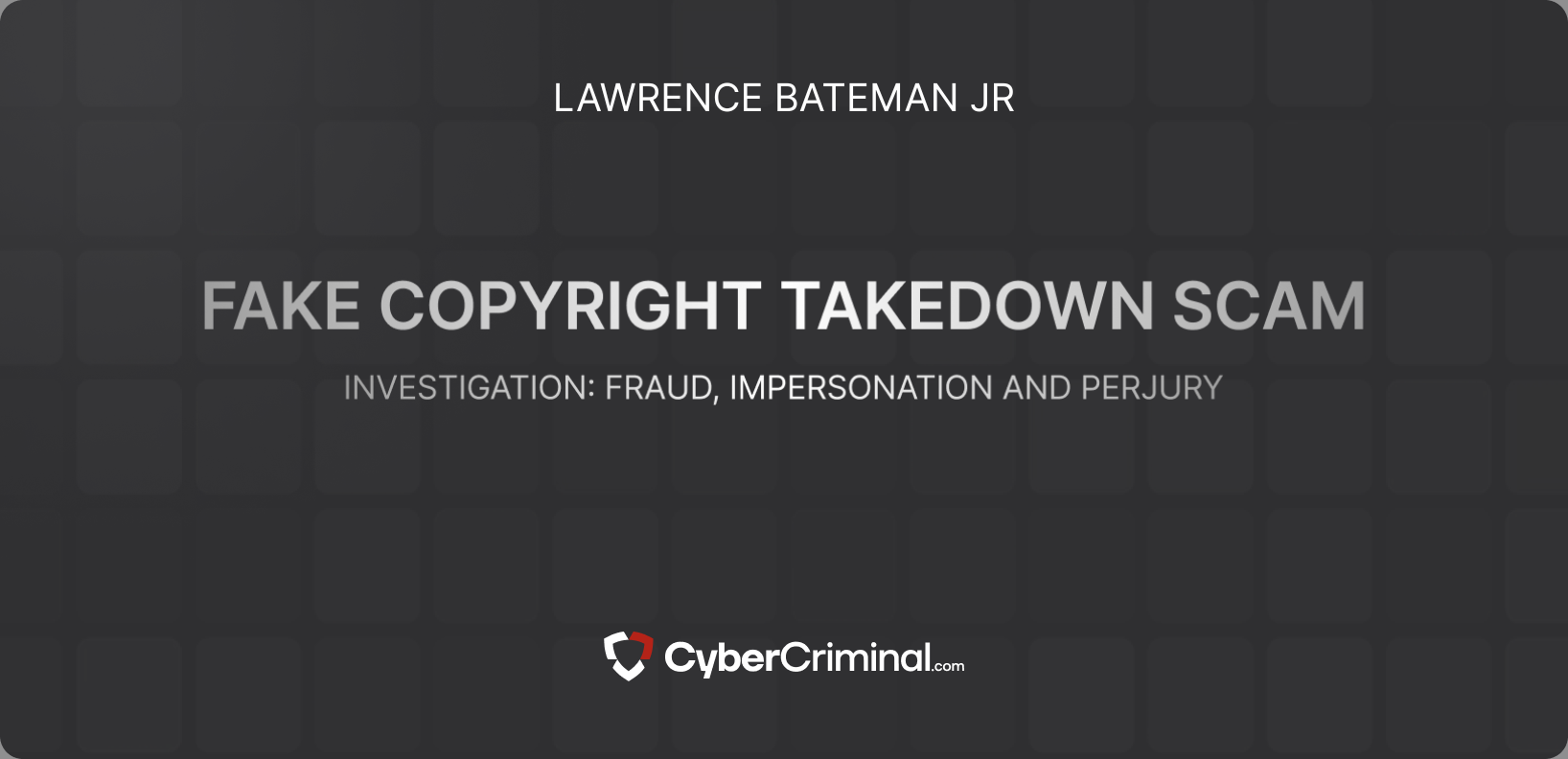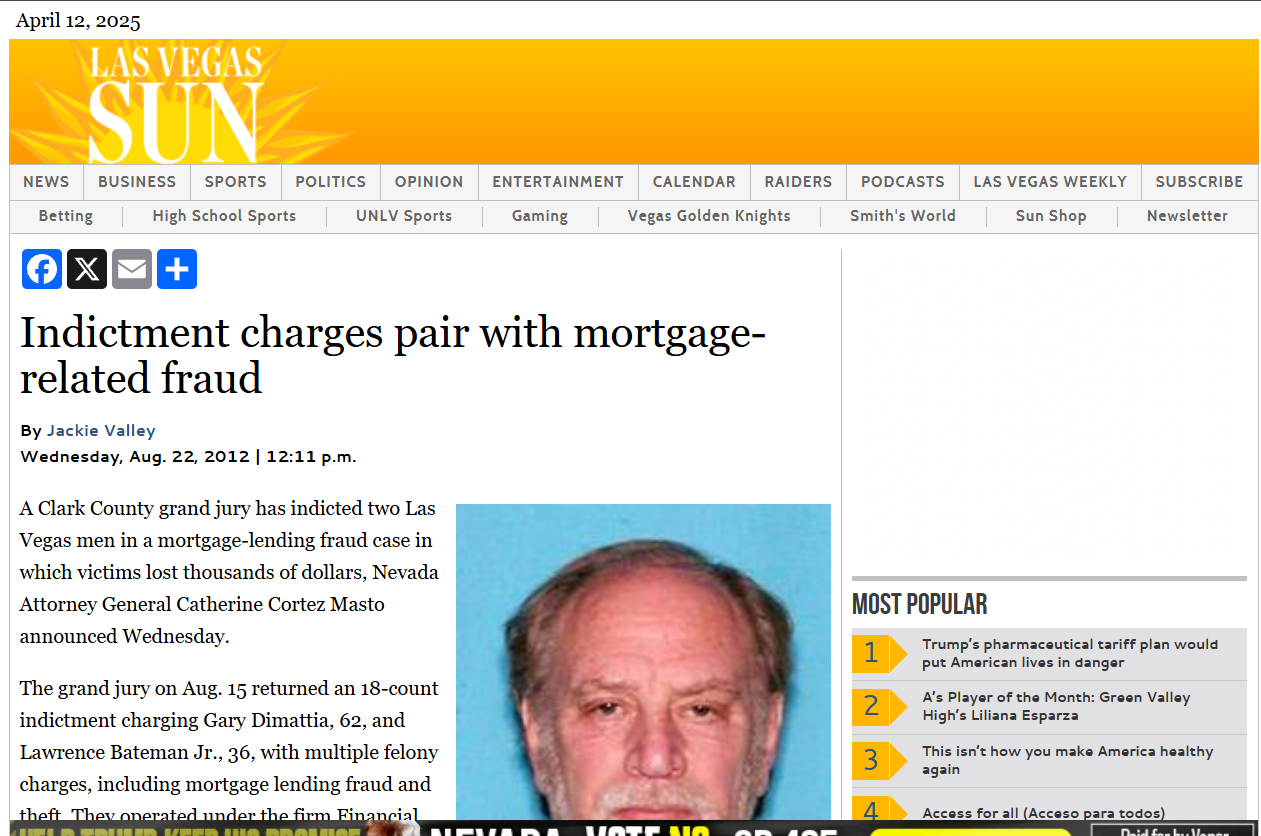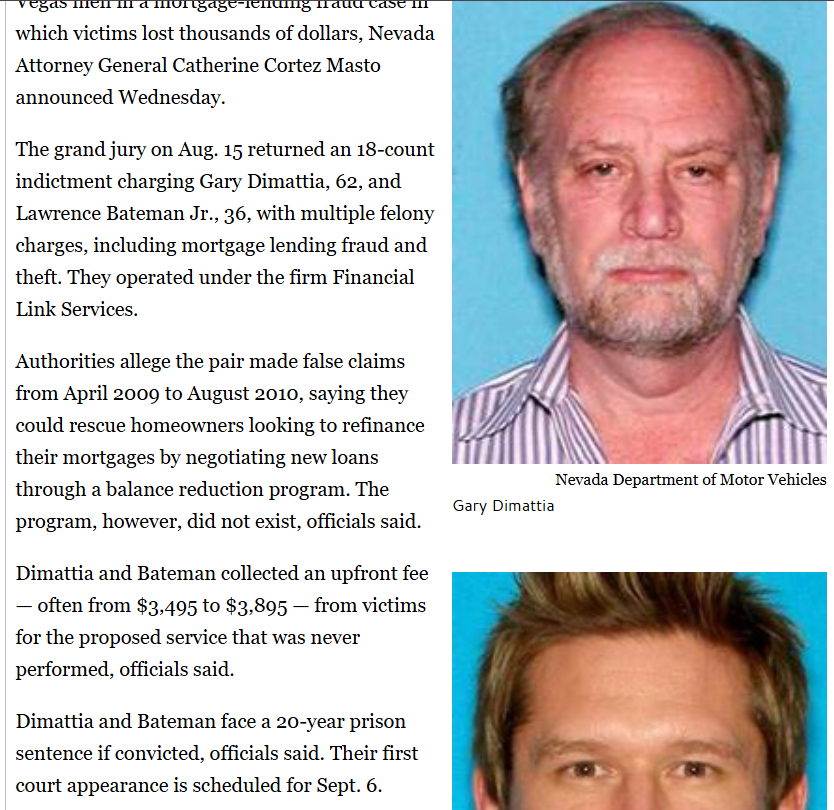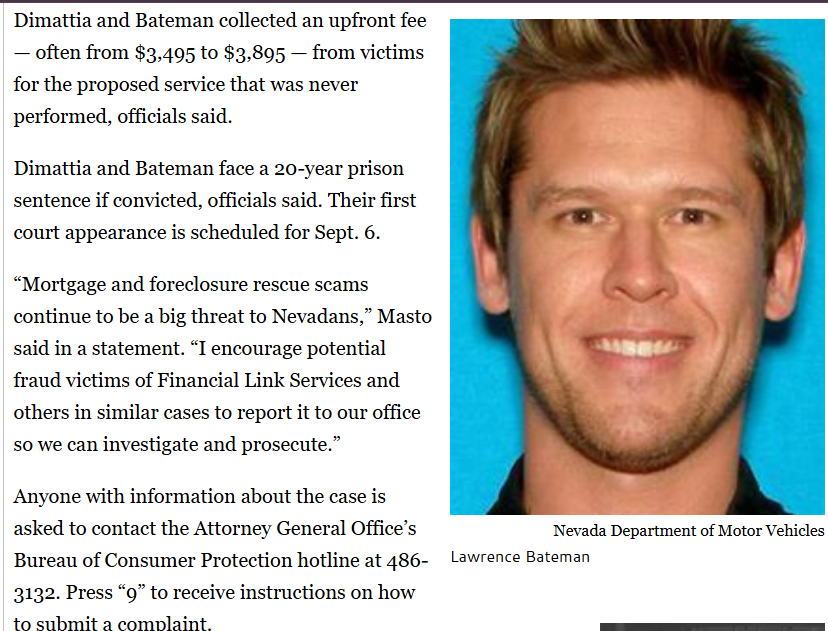- Home
- Investigations
- Lawrence Bateman Jr

Lawrence Bateman Jr
Threat Alert- Investigation status
- Ongoing
We are investigating Lawrence Bateman Jr for allegedly attempting to conceal critical reviews and adverse news from Google by improperly submitting copyright takedown notices. This includes potential violations such as impersonation, fraud, and perjury.
- Alias
-
Lawrence Bateman
- Company
-
CMG Financial
- Phone
-
+17022497451
- City
-
Scottsdale
- Country
-
United States
- Allegations
-
Fraudster

- https://lumendatabase.org/notices/39719552
- February 26, 2024
- Jon Wilson
- https://top39news.blogspot.com/2012/08/indictment-charges-pair-with-mortgage.html
- https://lasvegassun.com/news/2012/aug/22/indictment-charges-pair-mortgage-related-fraud/
Evidence Box and Screenshots



1 Alerts on Lawrence Bateman Jr
- RED FLAGS
Lawrence Bateman Jr: Mortgage Business-Overview
Lawrence Bateman Jr controversies, exposing mortgage fraud schemes, victim complaints, and regulatory scrutiny. This in-depth analysis uncovers red flags and risks tie...
Visit LinkHow Was This Done?
The fake DMCA notices we found always use the ? back-dated article? technique. With this technique, the wrongful notice sender (or copier) creates a copy of a ? true original? article and back-dates it, creating a ? fake original? article (a copy of the true original) that, at first glance, appears to have been published before the true original.


What Happens Next?
The fake DMCA notices we found always use the ? back-dated article? technique. With this technique, the wrongful notice sender (or copier) creates a copy of a ? true original? article and back-dates it, creating a ? fake original? article (a copy of the true original) that, at first glance, appears to have been published before the true original.
01
Inform Google about the fake DMCA scam
Report the fraudulent DMCA takedown to Google, including any supporting evidence. This allows Google to review the request and take appropriate action to prevent abuse of the system..
02
Share findings with journalists and media
Distribute the findings to journalists and media outlets to raise public awareness. Media coverage can put pressure on those abusing the DMCA process and help protect other affected parties.
03
Inform Lumen Database
Submit the details of the fake DMCA notice to the Lumen Database to ensure the case is publicly documented. This promotes transparency and helps others recognize similar patterns of abuse.
04
File counter notice to reinstate articles
Submit a counter notice to Google or the relevant platform to restore any wrongfully removed articles. Ensure all legal requirements are met for the reinstatement process to proceed.
05
Increase exposure to critical articles
Re-share or promote the affected articles to recover visibility. Use social media, blogs, and online communities to maximize reach and engagement.
06
Expand investigation to identify similar fake DMCAs
Widen the scope of the investigation to uncover additional instances of fake DMCA notices. Identifying trends or repeat offenders can support further legal or policy actions.

Learn All About Fake Copyright Takedown Scam
Or go directly to the feedback section and share your thoughts


Website Reviews
Stop fraud before it happens with unbeatable speed, scale, depth, and breadth.
Recent Reviews

Cyber Investigation
Uncover hidden digital threats and secure your assets with our expert cyber investigation services.
Recent Reviews

Threat Alerts
Stay ahead of cyber threats with our daily list of the latest alerts and vulnerabilities.
Recent Reviews

Client Dashboard
Your trusted source for breaking news and insights on cybercrime and digital security trends.
Recent Reviews
Gamsgo
Fake DMCA Investigation
FXNovus
Fake DMCA Investigation
Scott Leonard
Fake DMCA Investigation
User Reviews
Discover what real users think about our service through their honest and unfiltered reviews.
1.7
Average Ratings
Based on 10 Ratings
Astro Drifter
He’s mastered the art of exploitation. I can’t believe I trusted this guy.
12
12
Quantum Flux
Everything from his pitch to paperwork felt staged and crooked. Avoid at all costs. ⚠️
12
12
Nebula Void
Bateman Jr. has left a trail of destroyed finances and broken promises. Classic con artist behavior.
12
12
Teagan Stokes
I've been following Bateman for a while, and the red flags are too many to ignore. He's just another example of corporate greed.
12
12
Aurora Weber
It’s hard to believe anyone would trust him after all those allegations, doesn’t sound like someone who should be in charge of anything.
12
12
Lior Calderon
Honestly, he sounds more like a career con artist than a businessman. The pattern here is too obvious to ignore.
12
12
Dream Hays
Every time you Google his name, it’s a new lawsuit or scandal. If that doesn’t scream red flag, I don’t know what does.
12
12
Mika Zimmerman
This dude ran scams like it was his 9-to-5. Financial fraud, embezzlement, insider trading—he checked every dirty box in the book.
12
12
Delilah Carter
How does Bateman sleep at night knowing he’s got a whole list of scandals following him? ????
12
12
Victor Adams
if I had a nickel for every scam Bateman Jr. seems to be involved in, I’d be a millionaire by now. It’s like watching a slow-motion trainwreck, where you know it’s coming, but you can’t look away. Between financial misconduct,...
12
12
You are Never Alone in Your Fight
Generate public support against the ones who wronged you!
Featured Cyber Investigations
Explore our most impactful cyber investigations, where we uncover coordinated digital deception, expose fraudulent takedown schemes, and reveal the hidden mechanics behind online manipulation.
Gamsgo
Fake DMCA Investigation
FXNovus
Fake DMCA Investigation
Scott Leonard
Fake DMCA Investigation
Claudio Teseo
Fake DMCA Investigation
Salim Ahmed...
Fake DMCA Investigation
KTV Group...
Fake DMCA Investigation
Emarlado.com
Fake DMCA Investigation
GoodSkin Clinics
Fake DMCA Investigation